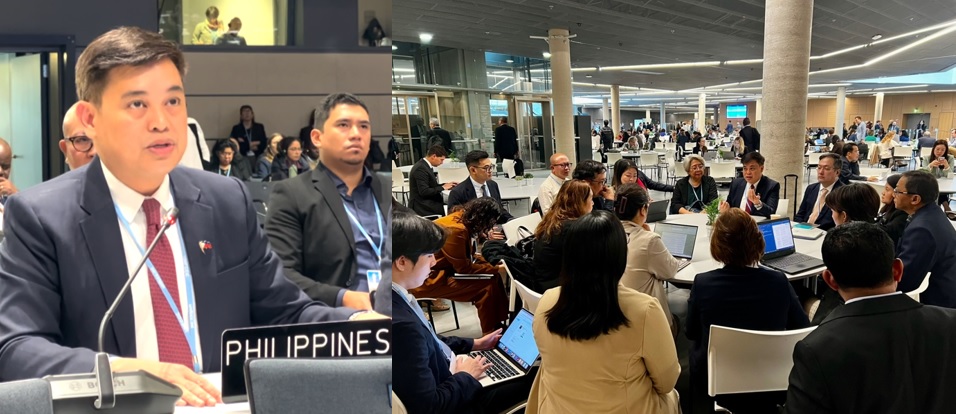
June 04, 2024 Tuesday

BONN, Germany, June 4, 2024 – The Philippines called for urgent and transformative climate action at the joint opening plenary of the 60th Sessions of the Subsidiary Body for Scientific and Technological Advice (SBSTA) and the Subsidiary Body for Implementation (SBI).
“We are now at a point of no return,” said Secretary Robert E.A. Borje, Vice Chairperson and Executive Director of the Climate Change Commission, and Co-Head of the Philippine Delegation to the 60th Sessions of Subsidiary Bodies (SB60) of the United Nations Framework Convention on Climate Change (UNFCCC).
He emphasized the need for stronger and sustained momentum for climate action rooted in science, evidence, and indigenous and local knowledge. Underscoring the critical decade ahead, Borje called for significant progress towards enhanced resilience and low-carbon, sustainable development.
Under the leadership of President Ferdinand R. Marcos, Jr., the Philippines has aligned its economic and prosperity agenda with climate change goals. Climate change is now integral to national policies, guiding planning, implementation, and decision-making at all levels.
Borje urged nations to build on COP28 outcomes, including the Global Stocktake (GST-1) results, the UAE Global Climate Resilience Framework, and the operationalization of the Loss and Damage Fund.
He emphasized the urgency of advancing all agenda items, particularly the determination of a new collective quantified goal on climate finance.
"The Philippines expresses grave concerns over the destruction caused by extreme weather events in Asia and the Pacific, Africa, and other regions. We need to change these stories of developing countries from fragility to agility," Borje said.
The Philippines has recently completed its first National Adaptation Plan (NAP), becoming the third ASEAN country and the 56th in the world to submit a NAP.
Driven largely by domestic resources and bilateral partnerships, the Philippines is working on the NDC Implementation Plan, Just Transition Work Programme, Biennial Transparency Report, Long Term Strategy, and NDC updating.
Borje called for collective action to:
Close mitigation and adaptation gaps and support the development and implementation of NAPs and NDCs by developing nations.
Urgently operationalize the Loss and Damage Fund, with the Philippines ready to participate in the decision-making process.
Implement the Just Transition Work Programme to uphold human rights, create green jobs, enhance livelihoods, and develop green and blue economies.
Accelerate the provision, mobilization, and delivery of finance, technology, and capacity from developed to developing countries.
Ensure transformative climate action for all vulnerable populations, including indigenous peoples, local communities, women and girls, children and youth, the elderly, and differently-abled individuals.
With the evolving needs of developing nations, Borje underscored the need for collective action, that is transformative, long-term, and sustainable.
“But we must be clear: in our joint work, we cannot be satisfied with providing temporary reprieve for the weak, the least, and the last. This approach will only lead us to a permanent retreat, and certain perdition. This cannot and must not happen,”
Borje also stressed the need for inclusive processes and universal participation to restore trust and confidence in the multilateral process of the UNFCCC. He reaffirmed the Philippines' commitment to engage all Parties and stakeholders to achieve global climate goals.
“There is no turning back. We must forge ahead and move forward together for humanity’s sake, particularly for the most vulnerable and at-risk. Let us work together and create the results we want and need,” Borje declared.
As one of the 198 Parties to the UNFCCC, the Philippines participates in SB60 intersessional climate negotiation.
The Philippine delegation is composed of 11 agencies, including CCC, the Department of Environment and Natural Resources (DENR), Department of Foreign Affairs (DFA), Department of Energy (DOE), Department of Finance (DOF), Department of Agriculture (DA), Department of Labor and Employment (DOLE), Department of Interior and Local Government (DILG), National Economic and Development Authority (NEDA), Presidential Communication Office (PCO), and Philippine Information Agency (PIA).
SB60 held in Bonn, Germany from 3 to 13 June 2024 provides a crucial platform for dialogue and negotiation leading up to COP29 in Baku, Azerbaijan.